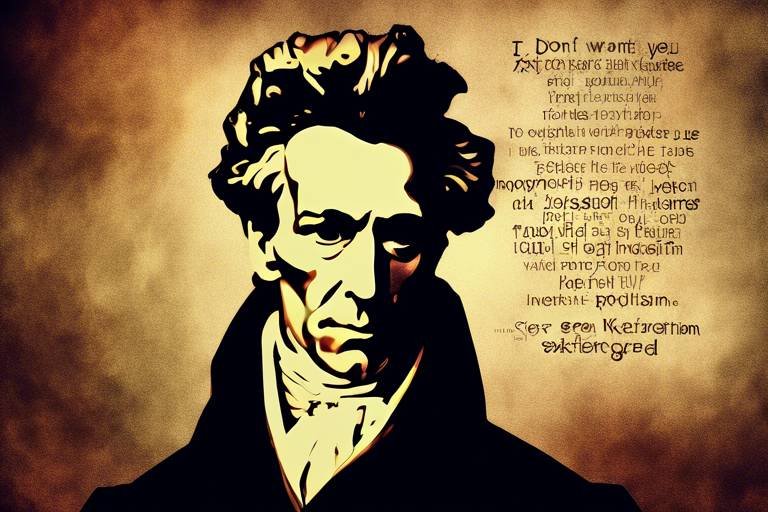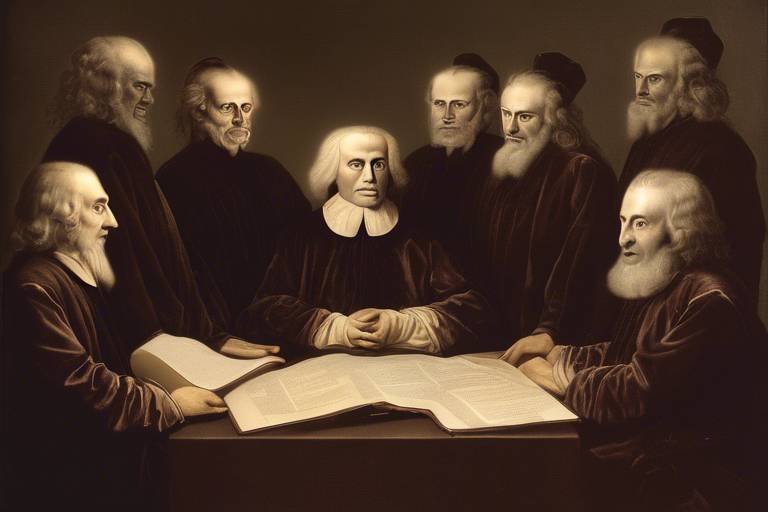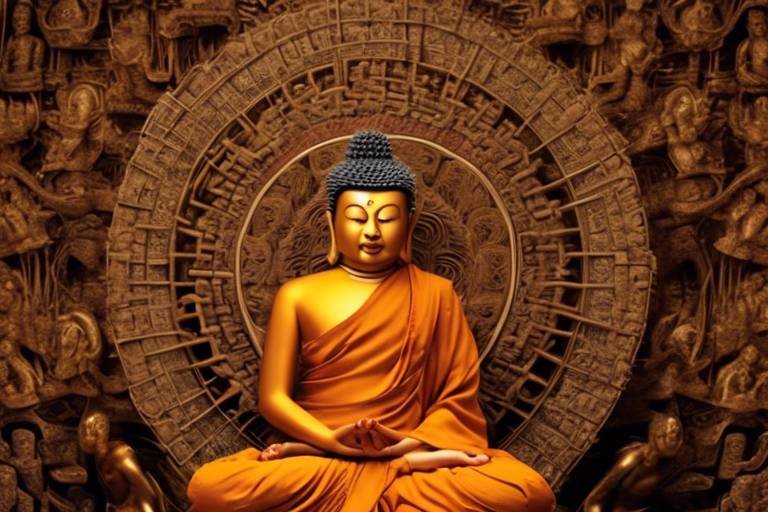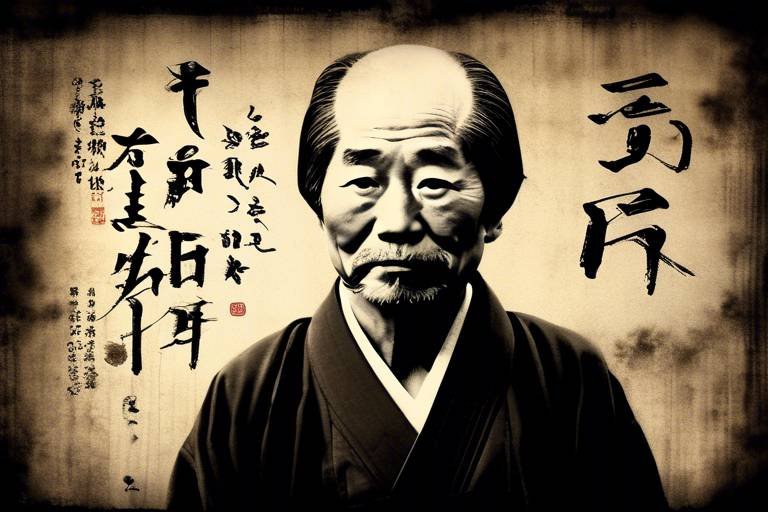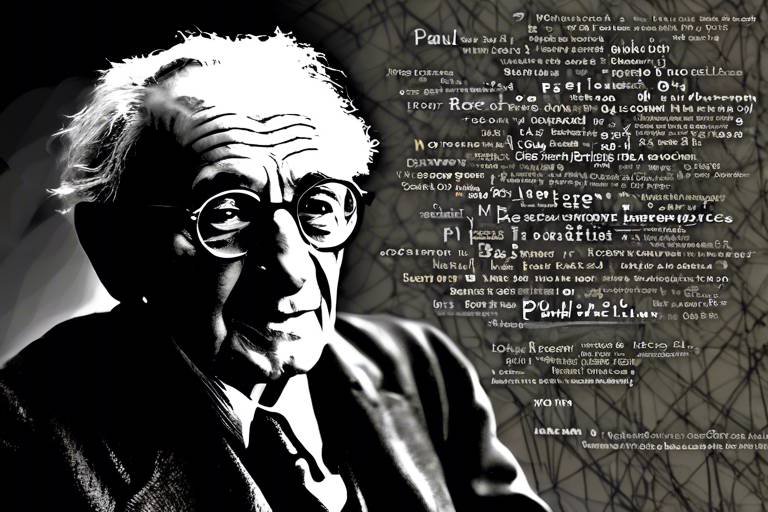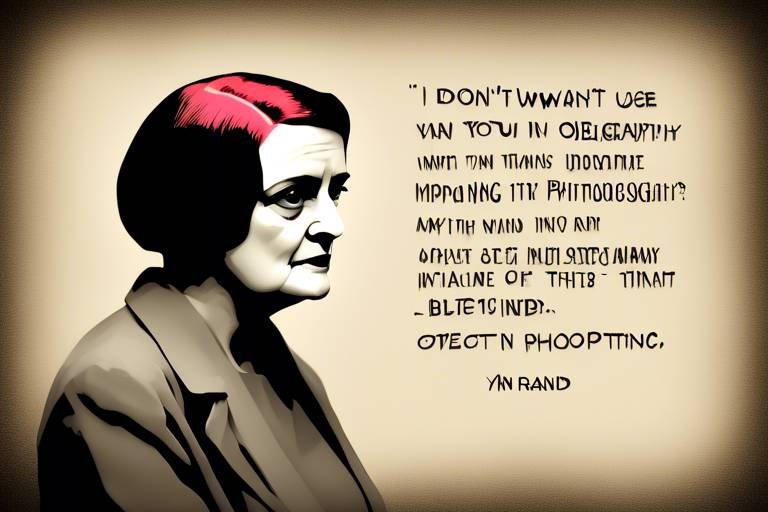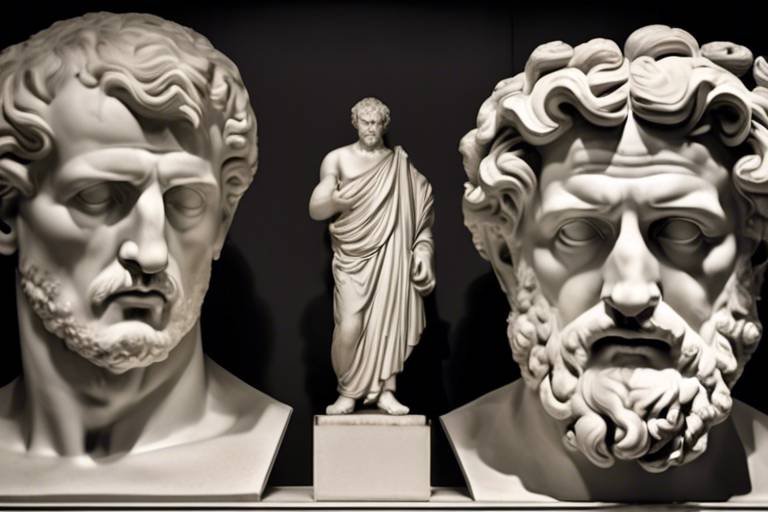The Concept of Subjectivity in Sartre's Philosophy
Jean-Paul Sartre, a towering figure in existential philosophy, revolutionized the way we understand subjectivity. His thoughts on this concept delve deep into the essence of human existence, shedding light on how we perceive ourselves and our place in the universe. At the heart of Sartre's philosophy is the idea that each individual is not merely a passive observer of life but an active participant, constantly shaping their own reality through choices and actions. This article will explore the intricacies of Sartre's interpretation of subjectivity, emphasizing its significance in the realms of existentialism, freedom, and the human experience.
For Sartre, subjectivity is intricately tied to consciousness. He proposed that consciousness is not just a vessel for thoughts but a self-aware, reflective state that defines our very being. This means that our consciousness is what allows us to engage with the world around us, influencing how we perceive reality. Think of it like a lens through which we view our lives; the clearer the lens, the more authentic our understanding of ourselves and our choices becomes. Our perceptions, shaped by our consciousness, inform our identities and ultimately define our existence.
In Sartre's view, consciousness is the cornerstone of subjectivity. It is through consciousness that we are able to reflect on our experiences, question our motives, and recognize our freedom. This reflective state is not just about being aware; it’s about being aware of being aware. Sartre famously stated, "Consciousness is always consciousness of something," highlighting the relational nature of our awareness. This means that our thoughts and feelings are always directed toward something external, shaping our understanding of ourselves and the world.
As we navigate through life, our consciousness influences our perceptions and interpretations of events. This dynamic interplay between consciousness and reality suggests that we are not merely shaped by external forces; rather, we actively construct our identities through our interpretations and choices. This interplay is crucial to understanding how we relate to ourselves and others, as well as how we find meaning in our lives.
Another pivotal aspect of Sartre's philosophy is the concept of authenticity. He encourages individuals to embrace their true selves, urging us to live authentically rather than conform to societal expectations. In a world rife with pressures to fit in, the challenge of maintaining authenticity becomes paramount. Sartre believed that authenticity is not just a personal choice but a moral imperative. It is about recognizing our freedom and taking responsibility for our actions.
However, the journey to authenticity is fraught with challenges. Societal norms and expectations often create barriers, leading individuals to compromise their true selves. This conflict can result in a sense of disconnection from our identities. To live authentically, one must confront these societal pressures and choose to define oneself on one’s own terms. This is not an easy task, but it is essential for personal growth and fulfillment.
Freedom, in Sartre's philosophy, is both a gift and a burden. While it allows us to make choices and shape our identities, it also comes with the weight of responsibility. Every decision we make has consequences, and with that comes the existential anxiety of realizing that we are the architects of our lives. This burden can be overwhelming, leading to feelings of dread or uncertainty. Yet, it is through this very freedom that we find our essence and purpose.
Existential anxiety is a natural response to the realization of our freedom and the responsibilities that accompany it. It's that nagging feeling that arises when we consider the implications of our choices. Sartre argues that this anxiety is a fundamental aspect of the human condition. It drives us to seek meaning in an indifferent universe, pushing us to confront our fears and embrace our freedom. Understanding this anxiety can be liberating; it encourages us to take ownership of our lives and make conscious choices.
At the core of Sartre's concept of subjectivity is the idea of choosing oneself. This means that we are not defined by external circumstances or societal labels; rather, we have the power to shape our identities through our choices. Each decision we make is an opportunity to assert our individuality and authenticity. Sartre emphasizes that we must actively engage in this process, recognizing that our choices reflect who we are and who we wish to become.
Sartre's exploration of subjectivity extends into the realm of interpersonal relationships. He posits that our sense of self is not formed in isolation; rather, it is shaped by our interactions with others. The dynamic between self and others creates a complex web of influences that can either enhance or hinder our authenticity. Understanding this interplay is crucial for navigating relationships and maintaining a strong sense of self amidst external pressures.
In Sartre's philosophy, bad faith represents the denial of one's freedom and responsibility. It's a form of self-deception where individuals convince themselves that they are bound by circumstances or societal roles, thus escaping the anxiety of choice. This denial can lead to a conflict between authentic existence and the roles we play in society. Recognizing and confronting bad faith is essential for living authentically and embracing our freedom.
Real-world examples of bad faith can be seen in various aspects of life. For instance, consider someone who stays in a job they despise simply because it is expected of them. By conforming to societal norms, they sacrifice their authenticity and happiness. Such self-deception can stifle personal growth and lead to a sense of unfulfillment. Recognizing these patterns is the first step toward overcoming bad faith and reclaiming one's freedom.
To overcome bad faith, one must cultivate self-awareness and confront their choices. This involves reflecting on motivations, questioning societal expectations, and embracing the freedom that comes with responsibility. By fostering authentic living through conscious decision-making, individuals can break free from the constraints of bad faith and fully embrace their identities. The journey to authenticity may be challenging, but it is ultimately rewarding, leading to a more fulfilling and meaningful existence.
- What is subjectivity in Sartre's philosophy? Subjectivity in Sartre's philosophy refers to the individual's capacity for self-awareness and the ability to shape their own reality through choices.
- How does consciousness relate to subjectivity? Consciousness is foundational to subjectivity, as it allows individuals to reflect on their experiences and understand their existence.
- What is bad faith? Bad faith is the denial of one's freedom and responsibility, often resulting in self-deception and conformity to societal norms.
- How can one overcome bad faith? Overcoming bad faith involves cultivating self-awareness, questioning societal expectations, and embracing the freedom that comes with personal responsibility.

The Nature of Consciousness
When we dive into the depths of Jean-Paul Sartre's philosophy, one of the first things that strikes us is his profound understanding of consciousness. Sartre argues that consciousness is not just a passive receiver of experiences; rather, it is a dynamic and reflective state that shapes how we perceive the world around us. Imagine consciousness as a lens through which we view reality, constantly filtering and interpreting our experiences. This lens is what defines our subjectivity, making each individual's perception unique and personal.
At its core, Sartre's conception of consciousness is rooted in the idea that it is inherently self-aware. This self-awareness allows us to reflect on our thoughts, feelings, and actions, creating a sense of identity that is fluid yet distinct. For Sartre, consciousness is a project—an ongoing endeavor where we actively engage with our surroundings and make choices that define who we are. This is where the magic happens; our consciousness not only shapes our reality but also influences our personal identity. In this way, we become the authors of our own existence, writing our stories with every decision we make.
However, this self-awareness comes with its own set of challenges. Sartre emphasizes that our consciousness is always in a state of becoming, which means we are never fully defined or complete. This ongoing process can lead to feelings of uncertainty and existential angst, as we grapple with the weight of our choices and the responsibility they entail. It's like trying to build a sandcastle on a beach where the tide is constantly shifting; just when you think you've created something solid, the waves come in and reshape it all.
To better understand this concept, let’s break down some key aspects of consciousness in Sartre's philosophy:
- Intentionality: Consciousness is always directed towards something; it is not an isolated entity but is constantly engaged with the world.
- Self-Reflection: The ability to reflect on one's own thoughts and actions allows for a deeper understanding of oneself.
- Freedom: With consciousness comes the freedom to make choices, which is both empowering and daunting.
In essence, Sartre's exploration of consciousness invites us to consider how our subjective experiences shape our understanding of reality. It challenges us to embrace our freedom and take responsibility for our choices, recognizing that our consciousness is not just a passive observer but an active participant in the creation of our lives. This realization can be both liberating and terrifying, as it places the power of existence squarely in our hands. So, the next time you ponder your place in the universe, remember that your consciousness is the key to unlocking the true essence of your being.
- What is Sartre's view on consciousness? Sartre views consciousness as a self-aware, reflective state that actively shapes our perception and reality.
- How does consciousness affect personal identity? Consciousness allows individuals to reflect on their experiences and choices, which in turn shapes their personal identity.
- What challenges does Sartre associate with consciousness? Sartre highlights the challenges of existential angst and the burden of freedom that come with self-awareness and the ability to make choices.

Authenticity is not just a buzzword; it’s a cornerstone of Sartre's philosophy. To him, living authentically means embracing one’s true self, rather than conforming to societal expectations or roles that others impose. Imagine a bird trapped in a cage, fluttering against the bars—this is how many people live their lives, confined by the expectations of family, friends, and society. Sartre challenges us to break free from those constraints and explore the vast sky of our own potential.
But what does it really mean to be authentic? Sartre suggests that authenticity involves a deep understanding of oneself, requiring individuals to confront their desires, fears, and the reality of their existence. It’s about recognizing that we are not merely products of our environment, but rather, we are the architects of our own lives. This notion can be intimidating, as it places the onus of responsibility squarely on our shoulders. Yet, it is also incredibly liberating. By choosing to live authentically, we can cultivate a sense of individuality that is uniquely ours.
However, the path to authenticity is riddled with challenges. Society often imposes norms that dictate how we should behave, think, and feel. These expectations can create a conflict within us, leading to a struggle between our authentic selves and the roles we are expected to play. For instance, consider the pressure to pursue a conventional career path or to conform to social standards of success. This pressure can stifle our individuality and lead us to live in bad faith, where we deny our true selves in favor of acceptance.
To navigate this complex landscape, Sartre encourages us to engage in self-reflection and introspection. It’s essential to ask ourselves questions like:
- What do I truly want out of life?
- Am I living according to my own values or those imposed by others?
- How can I embrace my uniqueness without fear of judgment?
By answering these questions, we can begin to peel away the layers of societal expectations and uncover our authentic selves. It’s a journey that requires courage and vulnerability, but the rewards are profound. Living authentically not only enhances our personal identity but also enriches our relationships with others. When we embrace our individuality, we invite others to do the same, creating a ripple effect of authenticity in our communities.
In conclusion, authenticity and individuality are vital in Sartre's existential framework. They remind us that we are not merely passive observers in our lives; we are active participants, capable of shaping our destinies. By choosing to live authentically, we not only honor our true selves but also inspire those around us to embark on their own journeys of self-discovery.
- What does Sartre mean by authenticity?
Authenticity, according to Sartre, is the act of living in accordance with one’s true self, free from societal constraints and expectations. - How can I achieve authenticity in my life?
Achieving authenticity involves self-reflection, understanding your desires and values, and making conscious choices that align with your true self. - What is the role of society in shaping individuality?
Society often imposes norms and expectations that can suppress individuality, leading individuals to conform rather than express their true selves.

The Burden of Freedom
Freedom, as Jean-Paul Sartre articulates, is a double-edged sword. On one hand, it is a gift that offers individuals the power to define their own existence, to carve out their own paths, and to make choices that resonate with their true selves. On the other hand, this freedom comes with an immense burden—the weight of responsibility. When we are free, we are also responsible for our choices, and that responsibility can be daunting. Imagine standing at a crossroads, each path representing a different life, a different version of yourself. The thrill of possibility is exhilarating, but the fear of making the wrong choice can be paralyzing.
Sartre believed that with freedom comes the realization that we are the architects of our own lives. This realization can lead to what he termed existential anxiety, a profound sense of unease that arises when we acknowledge the vastness of our choices and the implications they carry. We often find ourselves asking: What if I choose wrong? What if my choice leads to regret? This anxiety is not merely a fleeting feeling; it’s a fundamental aspect of the human condition. It serves as a reminder that our lives are not preordained but are instead a series of choices that we must navigate.
Moreover, this burden of freedom can manifest in various ways. It can lead to a sense of isolation, as we grapple with the weight of our decisions alone. We might find ourselves avoiding choices altogether, clinging to the safety of indecision. In this way, freedom can feel more like a curse than a blessing. Yet, Sartre encourages us to embrace this burden. He argues that by confronting our freedom and the anxiety it brings, we can achieve a more authentic existence. It’s in the act of choosing that we define who we are.
To illustrate this point, consider the following aspects of the burden of freedom:
- Responsibility: Every choice we make has consequences, not just for ourselves but for others as well. This interconnectedness amplifies the weight of our decisions.
- Existential Anxiety: The awareness of our freedom can lead to feelings of anxiety and dread, as we contemplate the potential outcomes of our choices.
- Isolation: In recognizing our individuality and the unique paths we must take, we may feel isolated from others who do not share our experiences.
Ultimately, the burden of freedom is a call to action. It invites us to live deliberately and authentically, to own our choices and the paths we carve out for ourselves. While it may be easier to conform to societal expectations or to let others dictate our choices, Sartre implores us to resist this temptation. By embracing our freedom and the accompanying responsibility, we can lead lives that are not only meaningful but also profoundly our own.
- What does Sartre mean by freedom?
Freedom, in Sartre's philosophy, refers to the ability of individuals to make choices and shape their own existence without being constrained by external forces. - How does existential anxiety relate to freedom?
Existential anxiety arises from the realization of one's freedom and the weight of responsibility that comes with making choices. - Can freedom lead to isolation?
Yes, the recognition of our individual paths can create a sense of isolation, as we navigate our unique experiences and choices. - How can one overcome the burden of freedom?
By embracing one's choices and responsibilities, fostering self-awareness, and living authentically, one can navigate the burden of freedom more effectively.

Existential Anxiety
Existential anxiety is a profound realization that often strikes when one becomes acutely aware of their own freedom. Imagine standing on the edge of a vast cliff, looking out into an endless abyss; this is akin to the feeling of existential anxiety. It is that unsettling sensation that arises when we confront the weight of our choices and the inherent responsibility that comes with our freedom. Sartre argues that this anxiety is not just a fleeting emotion but a fundamental aspect of the human experience. It forces us to grapple with the question: what does it truly mean to exist?
This anxiety can be triggered by various life events, such as major decisions, relationships, or even the mundane routines of daily life. It often leads individuals to question their purpose and the significance of their choices. Are we merely products of our environment, or do we have the power to shape our own destinies? This internal conflict can manifest in several ways:
- Self-doubt: Individuals may question their abilities and worth, leading to a paralysis of action.
- Fear of failure: The potential consequences of our choices can be daunting, making us hesitant to act.
- Isolation: The realization that we are ultimately alone in our choices can create a sense of disconnection from others.
As Sartre suggests, this existential anxiety is not inherently negative. In fact, it can serve as a catalyst for personal growth and self-discovery. By acknowledging and confronting this anxiety, individuals can begin to understand themselves on a deeper level. It encourages a journey inward, prompting us to ask critical questions about our values, beliefs, and desires. This introspection can lead to a more authentic existence, where we embrace our freedom rather than shy away from it.
However, the challenge lies in how we respond to this anxiety. Many people might resort to avoidance strategies, such as conforming to societal norms or adhering to the expectations of others. This is where the danger of falling into bad faith comes into play, as individuals may deny their freedom and responsibility in order to escape the discomfort of existential anxiety. This denial can stifle personal growth and lead to a life that feels inauthentic and unfulfilled.
Ultimately, existential anxiety is a double-edged sword. It can either paralyze us with fear or propel us toward a more meaningful existence. The choice is ours. By embracing our freedom and the anxiety that accompanies it, we can learn to navigate the complexities of life with a sense of purpose and authenticity.
- What is existential anxiety? Existential anxiety refers to the discomfort and unease that arise from the awareness of one's freedom and the weight of personal choices.
- How does Sartre view existential anxiety? Sartre sees existential anxiety as a fundamental aspect of human existence that can lead to personal growth and authenticity when confronted.
- Can existential anxiety be beneficial? Yes, when acknowledged, it can serve as a catalyst for self-discovery and a more meaningful life.
- What are some common responses to existential anxiety? Common responses include avoidance, conformity, and denial of one's freedom, which can lead to a lack of authenticity.

Choosing Oneself
In the realm of Jean-Paul Sartre's existential philosophy, the concept of is not merely a suggestion; it is a fundamental act of existence. Sartre argues that every individual possesses the inherent capacity to shape their own identity through conscious choices. This idea can be both liberating and daunting, as it places the weight of personal responsibility squarely on our shoulders. Imagine standing at a crossroads, where each path represents a different version of yourself. This metaphorical intersection is where the act of choosing oneself becomes critical.
When we talk about choosing oneself, we delve into the essence of personal identity. It is about recognizing that we are not just products of our environments or the roles that society imposes on us. Instead, we have the power to define who we are, what we believe, and how we interact with the world around us. Sartre famously stated, “Existence precedes essence,” which means that we are not born with a predetermined purpose; rather, we create our essence through our choices and actions.
However, the journey of choosing oneself is fraught with challenges. As we navigate through life, societal expectations often loom large, creating pressure to conform. This can lead to a conflict between our authentic selves and the identities that society expects us to adopt. For instance, consider the pressure to pursue a conventional career path or adhere to cultural norms. When individuals prioritize these external expectations over their own desires, they risk losing touch with their true selves. It's like wearing a mask that fits perfectly but feels suffocating at the same time.
To illustrate the importance of choosing oneself, let’s consider a few scenarios:
- Career Choices: A person may feel compelled to follow in their family’s footsteps in a traditional profession, even if their passion lies in the arts. Choosing oneself means having the courage to pursue what truly resonates with their identity.
- Relationships: Individuals often find themselves in relationships that do not reflect their values or desires. Choosing oneself involves recognizing when a relationship is unhealthy and having the strength to walk away.
- Personal Beliefs: In a world filled with diverse opinions, it can be easy to adopt beliefs that are not genuinely our own. Choosing oneself requires critical reflection and the willingness to stand by one’s convictions.
Ultimately, the act of choosing oneself is a continuous process. It requires ongoing self-reflection and the courage to confront uncomfortable truths about our desires and motivations. As we make choices that align with our authentic selves, we not only cultivate a deeper sense of personal identity but also contribute to a more genuine existence. Embracing this journey can lead to a fulfilling life rich with meaning and purpose.
- What does it mean to choose oneself? Choosing oneself refers to the act of making conscious decisions that reflect one's true identity and values, rather than conforming to external expectations.
- How can I start the process of choosing myself? Begin by engaging in self-reflection to understand your desires and values, and then make decisions that align with those insights.
- What are the consequences of not choosing oneself? Failing to choose oneself can lead to feelings of dissatisfaction, anxiety, and a sense of disconnection from one's true identity.

choosing oneself
In the realm of Sartre's philosophy, the concept of is not merely an abstract idea; it is a fundamental act that defines our existence. Sartre argues that we are not born with a predetermined essence; instead, we become who we are through our choices. This notion can be quite liberating yet daunting at the same time. Imagine standing at a crossroads, where every path represents a different version of yourself. Which path will you take? This is the essence of choosing oneself—taking the reins of your life and steering it in the direction that resonates with your true self.
To choose oneself means to embrace authenticity, to live in accordance with one’s values, desires, and aspirations rather than succumbing to external pressures or societal norms. It’s about breaking free from the chains of conformity and allowing your unique identity to flourish. However, this journey is fraught with challenges. Many individuals grapple with the fear of judgment or the anxiety that comes with making significant life choices. They often find themselves caught in a web of expectations, both from society and from within. This is where self-awareness becomes crucial.
When we talk about , it’s essential to recognize the role of self-reflection. By examining our thoughts, feelings, and motivations, we can better understand what truly matters to us. This process might involve asking ourselves some tough questions:
- What do I genuinely want from life?
- Am I living for myself or for others?
- What values do I hold dear, and am I honoring them in my choices?
These inquiries are not just casual musings; they are pivotal in guiding us toward a life that is authentically ours. In a world that often demands conformity, the courage to choose oneself can lead to profound personal growth and fulfillment. However, it’s important to acknowledge that this journey is ongoing. Each choice we make shapes our identity and contributes to our understanding of who we are.
Moreover, choosing oneself is intertwined with the concept of responsibility. Sartre emphasizes that with freedom comes the weight of responsibility for our choices. This means that we cannot blame external circumstances for our situation; instead, we must own our decisions and their consequences. It’s like being an artist of your own life—every brushstroke, every color choice defines the masterpiece that is you. By actively choosing, we not only shape our existence but also influence the world around us.
In conclusion, the act of choosing oneself is a powerful assertion of individuality and freedom. It is about crafting a life that reflects our true selves, unencumbered by the expectations of others. While the path may be challenging, the rewards of living authentically are immeasurable. As we navigate through life, let us remember that we have the power to choose, to redefine our narratives, and ultimately, to choose ourselves.
- What does it mean to choose oneself? Choosing oneself involves embracing authenticity and making decisions that reflect your true values and desires rather than conforming to external expectations.
- How can I start choosing myself? Begin by engaging in self-reflection, asking yourself what you genuinely want from life, and making choices that align with your personal values.
- What are the challenges of choosing oneself? Challenges include fear of judgment, anxiety about making significant choices, and the pressure to conform to societal norms.
- Why is responsibility important in choosing oneself? Responsibility is crucial because it emphasizes that we must own our choices and their consequences, shaping not only our lives but also the lives of those around us.

as a fundamental aspect of subjectivity. This subsection explores how individuals can shape their identities through conscious choices and the implications of these decisions.
In the realm of Sartre's philosophy, the notion of choosing oneself stands as a pivotal element of subjectivity. Sartre asserts that individuals are not merely products of their circumstances; rather, they possess the inherent ability to shape their own identities through conscious choices. This idea is both empowering and daunting. Imagine standing at a crossroads, each path representing a different version of yourself. The choices you make at that intersection not only define who you are but also echo throughout your existence, influencing your perceptions, relationships, and even your future decisions.
When we talk about shaping identities, it’s essential to recognize that every decision—big or small—contributes to the mosaic of who we are. For instance, consider the decision to pursue a particular career. This choice doesn't just affect your professional trajectory; it also impacts your social circles, your values, and even your self-esteem. Sartre emphasizes that by consciously making these choices, individuals can assert their freedom and authenticity, crafting a life that resonates with their true selves.
However, the implications of these choices extend beyond the individual. They ripple outwards, affecting the lives of others and the fabric of society itself. When one chooses to live authentically, it can inspire others to do the same, creating a chain reaction of self-discovery and empowerment. Conversely, when choices are made out of fear or societal pressure, they can lead to a sense of disconnection and inauthenticity. This tension between authenticity and societal expectations is a recurring theme in Sartre's work, highlighting the struggle many face in the pursuit of their true selves.
To further illustrate this concept, let’s consider a few scenarios:
- Choosing a Career: Opting for a job that aligns with personal passions rather than societal expectations can foster a deeper sense of fulfillment.
- Personal Relationships: Engaging in relationships that reflect one’s true values rather than conforming to social norms can lead to richer connections.
- Self-Expression: Embracing one’s unique identity—be it through fashion, art, or lifestyle choices—can empower individuals to live more authentically.
Ultimately, the act of choosing oneself is not a one-time event but rather a continuous journey. Each choice, whether it leads to joy or regret, serves as a lesson that enhances our understanding of who we are. It is through this process of reflection and decision-making that we come to embrace our freedom and the weight of our responsibility. In Sartre's view, this journey is what makes existence meaningful, as it is through our choices that we define our essence.
- What does Sartre mean by "choosing oneself"? Sartre refers to the idea that individuals have the power to shape their identities through conscious choices, asserting their freedom and authenticity.
- How do choices influence our identity? Every decision we make contributes to our personal narrative, impacting our values, relationships, and self-perception.
- Can societal pressures affect our ability to choose authentically? Yes, societal expectations can create a conflict between our true selves and the roles we feel compelled to play, often leading to inauthentic living.
- Is choosing oneself a one-time decision? No, it is an ongoing process of reflection and choice that continues throughout life.

Interpersonal Relationships
When we think about , we often overlook how deeply they intertwine with our sense of self. Sartre's philosophy suggests that our identities are not formed in isolation but are profoundly influenced by our interactions with others. Imagine trying to define a color without reference to the spectrum; similarly, our understanding of who we are is often shaped by the reflections we see in the eyes of those around us.
In Sartre's view, the self is a dynamic entity, constantly evolving through relationships. Every interaction can be seen as a mirror, reflecting our choices, values, and beliefs. For instance, when we engage with friends, family, or even strangers, we are not just sharing experiences; we are also negotiating our identities. The way we present ourselves can change based on the audience, leading to a kind of performance that can sometimes feel inauthentic.
This brings us to the concept of the Other. Sartre argues that our perception of ourselves is heavily influenced by how we believe others perceive us. This can create a tension between our authentic selves and the selves we project. For example, consider a person who feels pressured to conform to societal expectations in their career. They might take on a role that doesn’t reflect their true passions simply to gain acceptance from peers or family. This internal conflict can lead to feelings of alienation and dissatisfaction.
Moreover, the nature of relationships can also introduce a certain existential conflict. Think about it: when we engage with others, we are not only sharing parts of ourselves but also facing the reality that others have their own subjective experiences and interpretations. This can create a sense of competition, where we feel the need to assert our individuality while simultaneously seeking connection. The struggle to balance authenticity and relational dynamics can be exhausting but is essential for personal growth.
To navigate these complexities, Sartre encourages us to embrace our freedom in relationships. This means recognizing that we have the power to define our connections on our own terms. It’s about choosing how we relate to others rather than falling into predefined roles. For instance, if a person feels stifled in a friendship that demands conformity, they might choose to have an honest conversation about their feelings, thereby taking a step towards greater authenticity.
In conclusion, interpersonal relationships are not just social constructs; they are vital to our understanding of subjectivity. By engaging with others, we not only shape our identities but also confront the existential realities of freedom, choice, and responsibility. In doing so, we can cultivate more meaningful connections that honor our true selves while acknowledging the influence of the Other.
- What is the role of the Other in Sartre's philosophy?
The Other plays a crucial role in shaping our identity and understanding of self, as our perception is often influenced by how we believe others perceive us. - How can one maintain authenticity in relationships?
Maintaining authenticity involves being honest about one's feelings and choices, even when it means challenging societal expectations or norms. - What is existential anxiety in the context of relationships?
Existential anxiety arises from the awareness of our freedom and the responsibilities that come with it, particularly in how we choose to engage with others.

The Role of Bad Faith
In the intricate tapestry of Jean-Paul Sartre's philosophy, the concept of bad faith emerges as a pivotal theme that underscores the struggle between authenticity and self-deception. At its core, bad faith represents a profound denial of one’s freedom and responsibility. Imagine standing at a crossroads, where each path represents a choice that defines who you are. Instead of choosing, you might opt to stand still, convincing yourself that the decision is beyond your control. This is the essence of bad faith—an escape from the weight of choice that ultimately shapes our existence.
Sartre argues that individuals often engage in bad faith to shield themselves from the anxiety that comes with absolute freedom. When faced with the daunting prospect of making choices that could alter their lives, many people prefer the comfort of conformity and societal expectations. They deceive themselves into believing that their actions are dictated by external forces, rather than acknowledging their inherent freedom to choose differently. This self-deception can manifest in various forms, such as adhering to societal norms or roles that stifle individuality.
To illustrate the concept further, consider the following scenarios where bad faith might manifest:
- A person who remains in a job they despise, convincing themselves that they have no other options, despite having the skills to pursue a more fulfilling career.
- An individual who stays in a toxic relationship, rationalizing their choice by claiming that love requires sacrifice, while ignoring their own needs and desires.
- A student who conforms to the expectations of their parents regarding career choices, suppressing their own passions and interests in the process.
These examples highlight how bad faith can lead to a conflict between one's authentic self and the roles imposed by society. As Sartre points out, this conflict not only hinders personal growth but also fosters a sense of existential despair. Individuals trapped in bad faith may find themselves questioning their purpose, grappling with feelings of emptiness, and ultimately feeling disconnected from their true selves.
Moreover, bad faith can be seen as a societal phenomenon, where groups collectively engage in self-deception to maintain the status quo. This raises critical questions about the nature of freedom and the societal structures that perpetuate conformity. Are we, as a society, complicit in fostering environments that encourage bad faith? This inquiry invites a deeper examination of how we can create spaces that promote authenticity and empower individuals to embrace their freedom.
In conclusion, the role of bad faith in Sartre's philosophy serves as a cautionary tale about the dangers of self-deception. It challenges us to confront our choices and the underlying motivations that drive them. By recognizing and overcoming bad faith, we can strive towards a more authentic existence, where our actions align with our true selves. Embracing this journey requires courage, self-awareness, and an unwavering commitment to living authentically, despite the societal pressures that may seek to constrain us.
- What is bad faith in Sartre's philosophy? Bad faith is the denial of one's freedom and responsibility, leading individuals to deceive themselves to avoid the anxiety of choice.
- How does bad faith affect personal growth? Bad faith hinders personal growth by creating a disconnect between one's authentic self and societal roles, leading to feelings of emptiness and despair.
- Can bad faith be overcome? Yes, individuals can overcome bad faith by cultivating self-awareness, confronting their choices, and embracing their freedom to live authentically.

Examples of Bad Faith
Bad faith, a concept deeply rooted in Sartre's philosophy, manifests in various forms in our everyday lives. It is essentially the act of deceiving oneself to avoid the anxiety that comes with making choices and accepting responsibility. Imagine a person working in a job they despise, yet they convince themselves that they have no other options. This self-deception is a classic example of bad faith, where the individual denies their freedom to choose a different path. Instead of confronting the reality of their situation, they opt for the comfort of conformity.
Another poignant illustration of bad faith can be seen in relationships. Consider a partner who stays in a toxic relationship, telling themselves, "I can't leave; I love them too much." Here, the individual is not only denying their own needs and desires but also the reality of the relationship's toxicity. They may believe that their love is a justification for their suffering, thus avoiding the responsibility of making a choice that could lead to personal growth and happiness.
In a broader societal context, bad faith can also be observed in how individuals conform to cultural norms and expectations. For instance, many might feel pressured to pursue a certain career path because it is deemed prestigious by society, rather than following their passion. This can lead to a life filled with regret and unfulfilled potential. The following table summarizes some common examples of bad faith:
| Situation | Example of Bad Faith | Consequence |
|---|---|---|
| Career Choice | Staying in a job for security despite disliking it. | Feelings of resentment and lack of fulfillment. |
| Relationships | Remaining in a toxic relationship out of fear of loneliness. | Emotional distress and stunted personal growth. |
| Social Norms | Conforming to societal expectations rather than pursuing personal passions. | Regret and a sense of lost identity. |
These examples illustrate how bad faith can permeate various aspects of life, leading individuals to forfeit their authenticity. It serves as a reminder that while the comfort of self-deception may seem appealing, it ultimately hinders personal growth and fulfillment. By recognizing and confronting these instances of bad faith, individuals can begin to reclaim their freedom and live more authentically.
- What is bad faith in Sartre's philosophy? Bad faith refers to the self-deception individuals engage in to escape the anxiety of choice and responsibility.
- How can I recognize bad faith in my life? Look for patterns where you may be denying your freedom or conforming to societal expectations at the expense of your true self.
- What are some strategies to overcome bad faith? Cultivating self-awareness, embracing personal responsibility, and making conscious choices can help you overcome bad faith.

Overcoming Bad Faith
Overcoming bad faith is a journey that requires both courage and self-awareness. It’s like peeling an onion; each layer reveals deeper truths about ourselves that we might have buried under societal expectations and norms. Sartre believed that to live authentically, we must confront the lies we tell ourselves and embrace our freedom. But how do we even begin this process? It starts with recognizing the signs of bad faith in our lives.
Firstly, we need to acknowledge when we are making excuses for our choices. Are we blaming our circumstances for our unhappiness? Are we convincing ourselves that we have no other options? This is where self-reflection comes into play. Taking time to sit with our thoughts and feelings can help us identify the patterns of self-deception that keep us trapped. Journaling can be an effective tool, allowing us to articulate our thoughts and feelings, making the unconscious conscious.
Next, we must confront the fear that often accompanies the idea of freedom. Freedom can be daunting; it comes with the weight of responsibility. To illustrate this, consider the following table that outlines the contrast between the comfort of bad faith and the challenge of authentic living:
| Bad Faith | Authentic Living |
|---|---|
| Comfort in conformity | Embracing individuality |
| Denial of responsibility | Acceptance of consequences |
| Fear of judgment | Courage to be oneself |
| Living for others' expectations | Living for one's own values |
As we can see, while bad faith offers a sense of comfort, authentic living requires us to step outside our comfort zones. This can be incredibly challenging, but it’s essential for personal growth. One practical strategy is to set small, achievable goals that align with our true selves. This might mean speaking up in a meeting, pursuing a hobby we love, or even changing our career path. Each small act of authenticity builds our confidence and strengthens our ability to make choices that reflect who we truly are.
Moreover, it’s crucial to surround ourselves with supportive individuals who encourage our authentic selves. Engaging in honest conversations with friends or joining communities that share our values can provide the necessary affirmation and motivation to overcome bad faith. Remember, we are not alone in this journey; others are also striving for authenticity, and sharing our experiences can help lighten the burden.
Lastly, we must practice self-compassion. Overcoming bad faith is not an overnight transformation; it’s a continuous process filled with setbacks and victories. Treating ourselves with kindness during this journey allows us to learn from our mistakes without falling back into self-deception. It’s like learning to ride a bike; we may stumble and fall, but each attempt brings us closer to mastering the ride.
In summary, overcoming bad faith involves a multifaceted approach that includes self-reflection, confronting fears, setting goals, seeking support, and practicing self-compassion. By committing to this journey, we can break free from the chains of self-deception and embrace a life of authenticity, where our choices reflect our true selves.
- What is bad faith? Bad faith is the act of deceiving oneself to avoid facing the reality of one's freedom and responsibilities.
- How can I recognize bad faith in my life? Look for patterns of self-deception, such as making excuses for your choices or blaming external factors for your unhappiness.
- What are some practical steps to overcome bad faith? Engage in self-reflection, set achievable goals, seek supportive relationships, and practice self-compassion.
- Is overcoming bad faith a one-time process? No, it is an ongoing journey that involves continuous self-awareness and personal growth.
Frequently Asked Questions
- What is subjectivity in Sartre's philosophy?
Subjectivity, in Sartre's view, refers to the individual's unique perspective and experience of reality. It emphasizes the importance of personal consciousness and how it shapes one's identity and existence. Sartre argues that our subjective experiences are fundamental to understanding our freedom and the choices we make in life.
- How does consciousness relate to subjectivity?
Consciousness is the cornerstone of Sartre's concept of subjectivity. He defines it as a self-aware and reflective state that allows individuals to perceive and interpret their existence. This consciousness not only shapes personal identity but also influences how we engage with the world around us, highlighting the active role we play in defining our reality.
- What does authenticity mean in Sartre's philosophy?
Authenticity, according to Sartre, involves embracing one's true self and living in accordance with one's values and beliefs. It challenges societal norms and expectations that often pressure individuals to conform. Sartre encourages people to pursue authenticity as a way to fully realize their subjectivity and live a meaningful life.
- What is the burden of freedom?
Sartre posits that freedom is both a blessing and a curse. While it allows individuals to make choices and shape their lives, it also comes with the heavy weight of responsibility. This burden can lead to existential anxiety as individuals grapple with the consequences of their decisions, ultimately influencing their subjective experiences.
- How does existential anxiety affect individuals?
Existential anxiety arises when individuals become aware of their freedom and the weight of their choices. This realization can lead to feelings of uncertainty and discomfort as they confront the inherent meaninglessness of life. Sartre suggests that this anxiety is a natural part of the human experience and can drive individuals to seek deeper meaning and understanding.
- What does "choosing oneself" mean?
"Choosing oneself" is a key concept in Sartre's philosophy that emphasizes the active role individuals play in shaping their identities. It involves making conscious choices that reflect one's true self, rather than succumbing to external pressures. This process is essential for achieving authenticity and fully embracing one's subjectivity.
- How do interpersonal relationships influence subjectivity?
Sartre argues that our relationships with others play a significant role in shaping our subjectivity. The self is not isolated; it is influenced by interactions and perceptions from others. This dynamic creates a tension between individual identity and the expectations imposed by society, highlighting the complexity of human existence.
- What is bad faith in Sartre's philosophy?
Bad faith refers to the denial of one's freedom and responsibility, often manifested through self-deception. Individuals may conform to societal roles or expectations to escape the anxiety that comes with making choices. Sartre critiques this behavior, emphasizing that it leads to a conflict between authentic existence and the pressures of conformity.
- Can you provide examples of bad faith?
Examples of bad faith include individuals who choose careers solely for societal approval rather than personal fulfillment, or those who remain in unhealthy relationships out of fear of being alone. These choices often stem from a desire to escape the discomfort of freedom and the responsibility that comes with it, ultimately hindering personal growth.
- How can one overcome bad faith?
Overcoming bad faith involves cultivating self-awareness and embracing one's freedom. Sartre encourages individuals to confront their choices honestly and acknowledge the responsibilities that accompany them. By fostering authentic living through self-reflection and accountability, individuals can break free from the constraints of bad faith and live more fulfilling lives.








